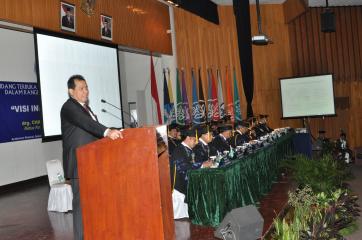Chairul: In 2030, Indonesia is predicted to be One Among the Developed Countries

Indonesia is expected to be a developed country in 2030 and will be claassified into the five largest developed countries. This stateman was expressed by chairman of the National Economic Committee (KEN), drg. Chairul Tanjung, MBA, in the 47th Anniversary of Bogor Agricultural University (IPB), Tuesday, 5 October 2010, on Campus Bogor Agricultural University. Chairul Tanjung expressed that to get such status the development and economic transformation should be carried out gradually. The first stage, starts from now up to 2015, is the stage of the restructuring ”Where we promote the 5% – 7% economic growth”, he said.
After the reformation, said drg.Chairul, Indonesia will enter the second stage, namely the economic acceleration. This stage starts from year 2015 to 2025. In this stage, Indonesia is expected to enter the industrialization era with the average economic growth of 9-11 percent per year. Then, in 2025-2030, Indonesia will enter into the sustainable stage. ”Where the growth and the contribution of service sectors will be high and exceeds the industrial sectors, during which Indonesia will be a grouped into the f developed countries,” he explained.
Further, Chairul expressed that the ideals to be one among the developed countries can be realized. As long as governments and the Indonesian communities are able to restore the three important pillars in the country. First, related to the development of human resources. How to improve the quality and quantity of the human resources. Second, related to the management of natural resources, where utilization of the endowed natural wealth will be based on the perception of sustainable production processes. Third, related to the management of development by the government. ”If those three stages will be implemented, the three pillars will bring Indonesia into the group of developed countries and will play an important role at global develoopemtn,”he said.
In response to the economic restoration, some people think whether the nationalization companies which operate on some natural resource development in Indonesia should be taken to make the Indonesian’ dream to happen, Chairul Tanjung said, "It could be! ‘It is undeniable that there were mistakes in the past. We could negotiate to correct them.”
In his remarks, Rector of Bogor Agricultural University, Prof. Dr. Herry Suhardiyanto, M. Sc stated that for about 47 (fourty seven) years the University have been implementing and has recorded in the national history of both education and agricultural development in the broad sense. Bogor Agricultural University has played an important role in the green revolution, particularly in initiating the concept of BIMAS up to its implementation that involved the students to go to the field. "In 1971, the concept of Cooperative Village Unit (KUD) was organized concurrently with the concept UPGK, as the implications of applying the concept Bimas. In 1973, Bogor Agricultural University again has recorded in the Indonesian history with the formulation of indicator for poverty measurement by Prof. Sajogyo which is still applicable today, "said Rector.
During the last year, Bogor Agricultural University has prooved to be the leading center (center of Excellence) that produced both national and international achievements. Some of which, in the year 2009, the University was very proud as its Faculty members and researchers was granted Extraordinary Intellectual Property Award for 2009 by category of Technology (The granted of Patent Rights), Plant Varieties (PVT Right), and field of science (Patent of Property Rights). Of the 21 inventors and researchers were Intellectual Property Award recipients in 2009 of the Government of Indonesia, five of whom were a lecturer/group of lecturers from Bogor Agricultural University. From 16 remaining, 7 of whom were students and alumni of Bogor Agricultural University. Thus, total of 21 inventors who were granted Intellectual Property Award of 2009, 12 (twelve) inventors were coming from 12 large families Bogor Agricultural University.
Another achievement was the recipient of the Indonesian Scholar Dissertation Award (ISDA) from the Ford Foundation (USA), an award for doctoral students who submit proposals dissertation research breakthrough and benefitial for society, Alhamdulillah, out of 21 (twenty one) of awardees, the six awardees were students of the Doctoral Program of Bogor Agricultural University. This is the highest number compared with other universities. Bogor Agricultural University also has proven itself as an innovative college. Some time ago, Faculty members of Bogor Agricultural University have dominated the list of Most Prospective Innovative Works for the Year 2010, selected by Business Innovation Center (BIC) and the Ministry for Research and Technology, namely 102 innovative works, 49 inventions (or almost 50%) were Bogor Agricultural University’s work. This achievement confirmed that similar achievements in previous years. As we know, previously, Bogor have dominated the list of Most Prospective Innovative Works for the Year 2010. Bogor Agricultural University has managed to dominate the 101 Most Innovative Prospective Indonesia Year 2009, and that is recorded with 24 works of innovative and Indonesia dominate the 100 Most Innovative Work Prospective Year 2008 was recorded with 21 innovative work. This award was the manifestation of Bogor Agricultural University commitment to produce the best innovative works as resulted by research and technology development for the Indonesian nation.
"Every member of Bogor Agricultural University community should be proud of the achievements the University made. Howeverr, we may not be satisfied with those achievements. We must continuesly intensify our efforts to create tremendous achievements that contributive to development of our nation. The 47th Anniversary will be the right time to affirm this commitment, to continue to seek and provide the best for the community, nation and state, "explained Rector. (Wied).



